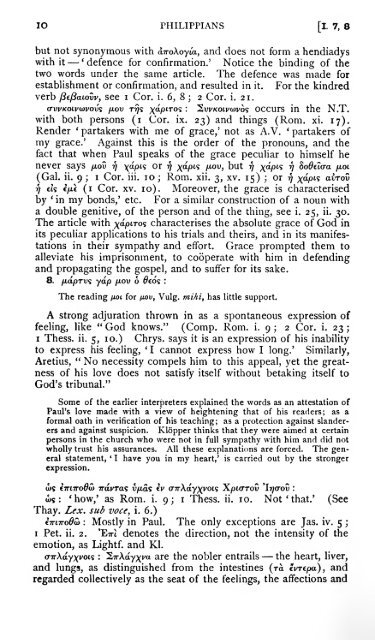Philippians and Philemon - MR Vincent - 1906.pdf
Philippians and Philemon - MR Vincent - 1906.pdf
Philippians and Philemon - MR Vincent - 1906.pdf
Create successful ePaper yourself
Turn your PDF publications into a flip-book with our unique Google optimized e-Paper software.
PHILIPPIANS [. 7, 8<br />
?<br />
but not synonymous with,<strong>and</strong> does not form a hendiadys<br />
with it — * defence for confirmation.' Notice the binding of the<br />
two words under the same article. The defence was made for<br />
establishment or confirmation, <strong>and</strong> resulted in it. For the kindred<br />
verb,see i Cor. i. 6, 8 ; 2 Cor. i. 21.<br />
^ : 205 OCCUrs in the ..<br />
with both persons (i Cor. ix. 23) <strong>and</strong> things (Rom. xi. 17).<br />
Render * partakers with me of grace,' not as A.V. ' partakers of<br />
my grace,' Against this is the order of the pronouns, <strong>and</strong> the<br />
fact that when Paul speaks of the grace peculiar to himself he<br />
or<br />
but 8(.<br />
never says ? 17 , (Gal. U. ; g Cor. iii. 10 ; Rom. xii. 3, xv. 15) ; or ?<br />
ct5 €/btc (i Cor. XV. 10). Moreover, the grace is characterised<br />
by 'in my bonds,' etc. For a similar construction of a noun with<br />
a double genitive, of the person <strong>and</strong> of the thing, see i. 25, ii. 30.<br />
The article with characterises the absolute grace of God in<br />
its peculiar applications to his trials <strong>and</strong> theirs, <strong>and</strong> in its manifes-<br />
tations in their sympathy <strong>and</strong> effort. Grace prompted them to<br />
alleviate his imprisonment, to cooperate with him in defending<br />
<strong>and</strong> propagating the gospel, <strong>and</strong> to suffer for its sake.<br />
8.<br />
The reading<br />
6 :<br />
for , Vulg. miAi, has little support.<br />
A strong adjuration thrown in as a spontaneous expression of<br />
feeling, like " God knows." (Comp. Rom. i. 9 ; 2 Cor. i. 23 ;<br />
I Thess. ii. 5, 10.) Chrys. says it is an expression of his inability<br />
to express his feeling, ' I cannot express how I long.' Similarly,<br />
Aretius, " No necessity compels him to this appeal, yet the greatness<br />
of his love does not satisfy itself without betaking itself to<br />
God's tribunal."<br />
Some of the earlier interpreters explained the words as an attestation of<br />
Paul's love made with a view of heightening that of his readers; as a<br />
formal oath in verification of his teaching; as a protection against sl<strong>and</strong>erers<br />
<strong>and</strong> against suspicion. Klopper thinks that they were aimed at certain<br />
persons in the church who were not in full sympathy with him <strong>and</strong> did not<br />
wholly trust his assurances. All these explanations are forced. The general<br />
statement, ' I have you in my heart,' is carried out by the stronger<br />
expression.<br />
0)5





